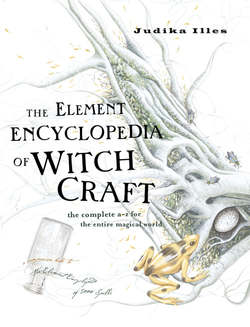Читать книгу The Element Encyclopedia of Witchcraft: The Complete A–Z for the Entire Magical World - Judika Illes - Страница 82
The Etruscan Library
ОглавлениеAccording to legend, Tages, Lord of Wisdom, emerged one day from out of a newly plowed field in the form of a young man with snakes for legs, bearing a book, which he gave to the Etruscan people. This book became the basis for their spiritual and mystical traditions, including their extremely sophisticated systems of divination and augury.
The Etruscans were a non-Indo-European people who inhabited northern and central Italy from approximately 800 BCE. Their memory survives in the name “Tuscany.” Scholarly debate rages as to whether the Etruscans were indigenous to the region or immigrants from Asia Minor or the Eurasian steppes. Very, very little, in fact, is known about the Etruscans although, unlike the Druids, it cannot be said that they didn’t have books. They were an extremely literate, educated, structured society, the dominant power in that area for centuries. The little that is known about them today is filtered through the eyes of their neighbors, the Romans and Greeks, who were uneasy with the Etruscans, not least because of the prominent presence and political and economic equality afforded to Etruscan women.
The Etruscans were what is known as a magical society and were viewed as great magicians. The English words “augury” and “auspicious” derive from Etruscan. Augury—a method of divination through the observation of birds—was pioneered by the Etruscans, while auspice or auspicious derives from “haruspex” (plural haruspices)—the title given the Etruscan priest/magician/seers.
The early kings of Rome were ethnic Etruscans. The very name “Rome” may derive originally from an Etruscan word. Unfortunately for them, the Etruscans found themselves sandwiched between warring, hostile Celts and Romans and bore the brunt. Although the Etruscans first dominated the Romans, they were eventually subjugated by them and not particularly nicely. Etruscans were granted Roman citizenship in 90 BCE but their leadership picked the wrong pony in a political dispute and so they ended up complete losers, their language suppressed and their culture outlawed.
Before he was emperor, Claudius (August 1, 10 BCE-October 13, 54 CE, emperor from 41–54) was a scholar. (This is the emperor who inspired the book and television series, I Claudius.) Claudius sought to preserve Etruscan traditions of magic, divination, and spirituality. The countryside was scoured for elderly Etruscans who were brought before him to be quizzed. The end result of Claudius’ efforts was a 20-volume compilation of Etruscan history, spirituality, and knowledge. Claudius established laws protecting the haruspices and convinced the Roman Senate to establish a library housing his 20 volumes as well as various other writings pertaining to Etruria. The Sibylline Books (see page 136), by then somewhat out of fashion, were moved into this storehouse of spiritual wisdom.
Christianity’s rise to power sounded the death knell for what remained of Etruscan culture. Arnobius, author of The Seven Books of Arnobius against the Heathen, exemplified the official attitude when he wrote in approximately 300 CE that “Etruria is the originator and mother of all superstitions.” Etruscan magical practices were still held in high regard by the general Roman population, if not the government, and thus were targeted for elimination.
The Christian general Flavius Stilicho, regent for the Emperor Honorius between 394 and 408 CE destroyed Claudius’ 20-volume Etruscan compilation as well as The Sibylline Books and the Tagetic Books, which had been stored in Rome’s Temple of Apollo. Today, we are still unable to decipher Etruscan writing; less than 100 words of the Etruscan language can be definitively translated.
